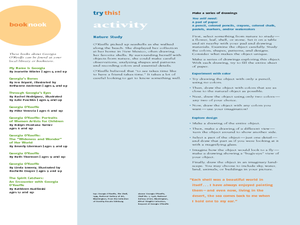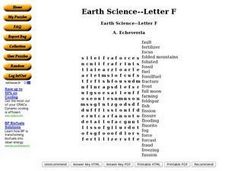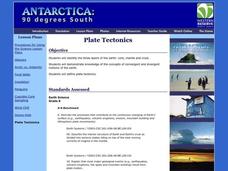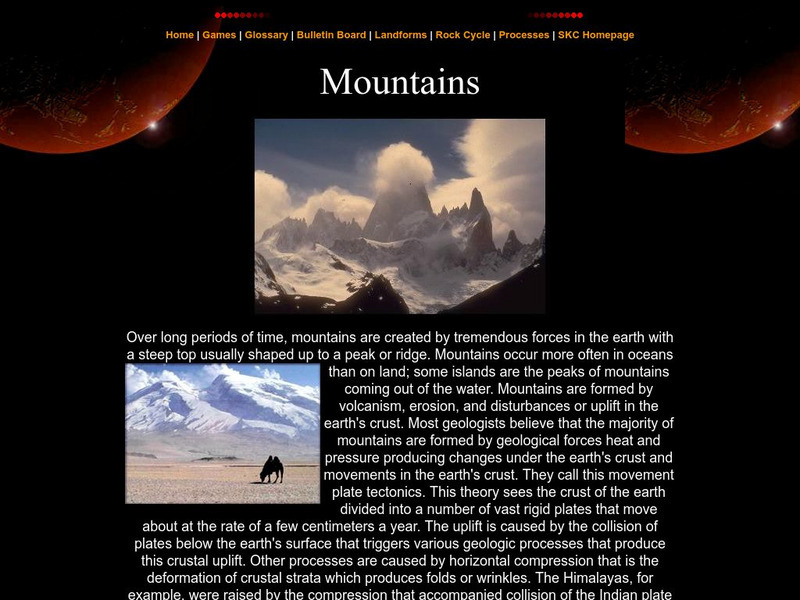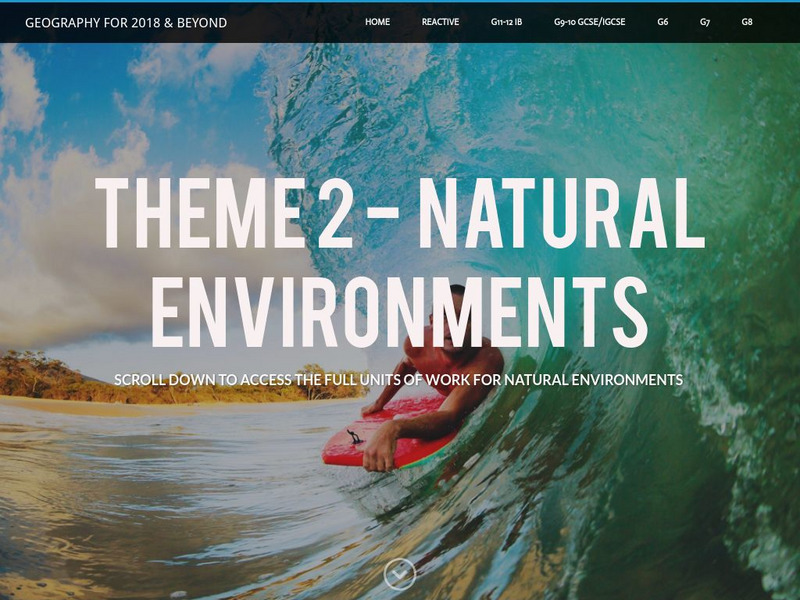Curated OER
Stressed to a Fault!
Eighth graders describe how stress builds up in the Earth's crust by the movement of tectonic plates. In groups, they relate the three types of stresses to the types of plate movements and explain how the stress causes faults to form. ...
Curated OER
The Beautiful Works of Georgia O'Keefe
Students discover the art of Georgia O'Keefe. In this art history lesson, students investigate the influential power nature has on art. Students create their own works of art by observing local nature.
Curated OER
Earth Science--Letter "F"
In this earth science activity, students locate and identify vocabulary terms related to earth science that begin with the letter "F." There are 24 words located in the puzzle.
Curated OER
Landscape Book
Students create a three-dimensional book about landscapes. They must show their understanding of shape, color and balance.
Curated OER
Seafloor Block Model
Students construct a 3-D block model of the ocean floor to study fundamental earth processes. This is a preconstructed cut out that allows the students to put it together but then to add their own colors as well. There is an evaluation...
Curated OER
Plate Tectonics
Students identify the three layers of the earth: core, mantle and crust. They demonstrate knowledge of the concepts of convergent and divergent motions of the earth and an understanding of plate tectonics.
Curated OER
Pass the Plate
Students define constructive forces. They describe how landforms are created as a result of constructive forces. Students recognize active volcano areas in the United States. They demonstrate an understanding of Panagea.
Curated OER
Predator and Prey Game
Students explore the why the balance among producers, predators and prey is necessary in order for an ecosystem to be sustained over time. Through web games and activities, they discover how each component of the food chain works to...
Curated OER
Writing Practice- Finish the Story- "Which Way"
In this finish the story writing practice worksheet, students read the beginning of a story entitled, "Which Way?" They finish the story, which is about a camping trip, with an original ending.
Curated OER
Learning About Maps
Students investigate the many uses and features of maps and globes and locate where they live on both. In this map lesson plan, student play a travel game and create their own maps to explore states, continents, countries, and islands.
Curated OER
Which Way?: Writing Practice
In this finish the story activity learning exercise, students read a 8 paragraph story entitled "Which Way?" and use the lines provided to finish the story as they wish.
Curated OER
Cartoons for the Classroom: Vanishing Newspapers
In this current events worksheet, students analyze a political cartoon about the changing newspaper industry and respond to 3 talking point questions.
Curated OER
Chocolate Chip Cookie Mining Worksheet
In this coal mining math worksheet, students perform a set of operations to determine profit of mining a "chocolate chip cookie" and graph results.
Curated OER
The Story of Hot Springs, 1500-1900 AD
Young scholars study the geology and hydrology of Arkansas hot springs and how they contributed to the development of the city of Hot Springs. They create advertisements for the city of Hot Springs and the therapeutic effects of the waters.
Curated OER
A Look at the Geological History
In this geological history worksheet, students draw a cartoon strip to sequence how the North American continent grew. Students use information about continental drift to sequence events of how the different continents were formed.
Curated OER
Exploring and Comparing Other Communities
Third graders search TDC database for images of physical geography maps, weather maps, natural resources maps, and old travel brochures. They create a new travel brochure of an area of their choice using the information they gathered.
Curated OER
Change Happens
Fifth graders engage in a lesson to find information about the natural history of Puerto Rico. They practice using a variety of resources for research purposes. The same process of research is used for state of Wisconsin. Then students...
ClassFlow
Class Flow: Fold Mountains
[Free Registration/Login Required] A flipchart showing how fold mountains are created, where they can be found, and the way of life of people who live in them.
Science Struck
Science Struck: How Mountains Are Formed
Read about the different types of mountains and how they are formed.
Other
Southern Kings Consolidated School: Mountains
Site from the Southern Kings Consolidated School about mountains. Learn what mountains are and how they form.
Other
Digital Library for Earth System Education: Teaching Box: Mountain Building
A suite of lessons focusing on all aspects of how mountains are formed. Inquiry-based exploration of mountain building includes the rock cycle, mountain formation, plate tectonics, earthquakes, volcanoes, erosion, rocks, minerals, and...
Science4Fun
Science4 Fun: Mountains
What is a mountain? Discover how mountains are formed, the types of mountains, and their importance.
Geographypods
Geographypods: Theme 2: Natural Environments
A rich collection of highly engaging learning modules on topics related to the natural environment. Covers four main areas - plate tectonics, forms and processes, weather and climate, and rainforest and desert. Within each of these,...
Other
Joseph Wu Origami: What Is Origami?
A brief history of the art of Origami by Joseph Wu. Basic techniques, types of paper, and terminology are discussed.



